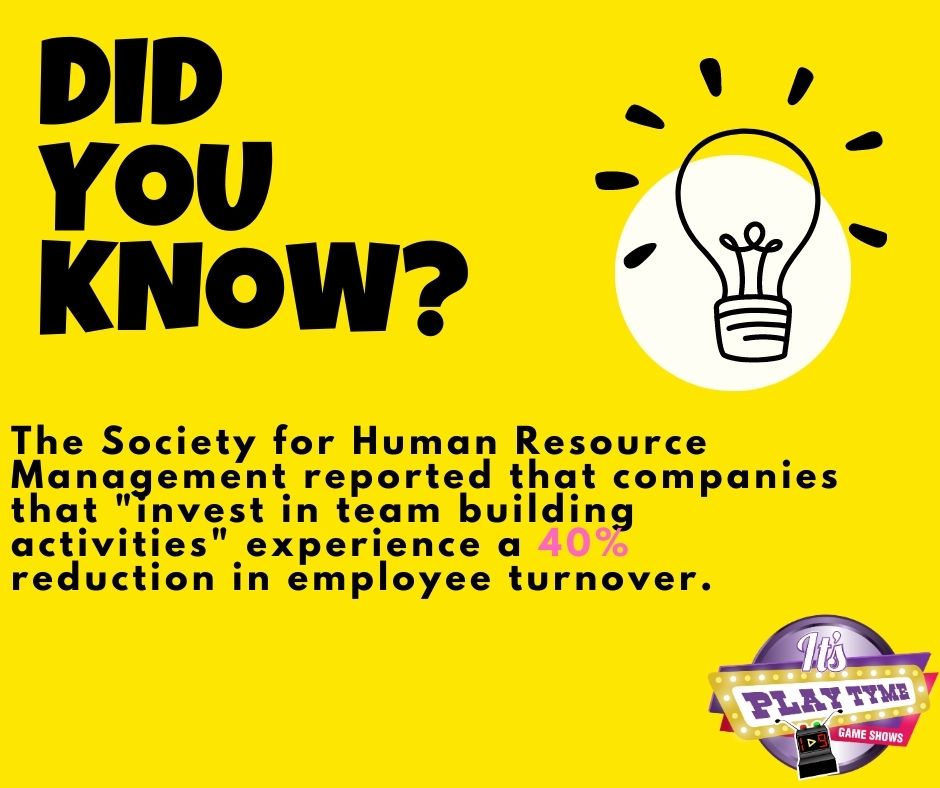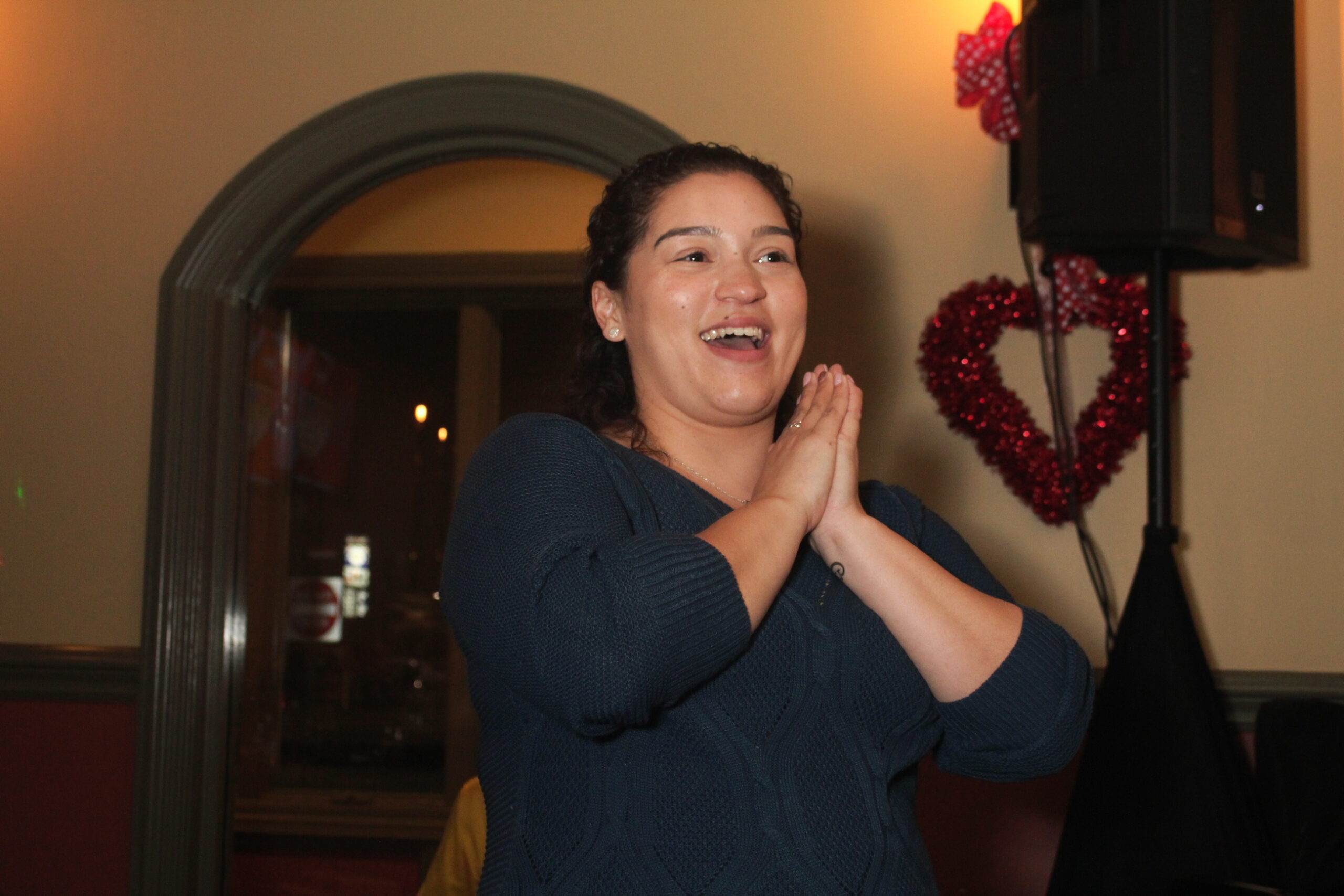Table of Contents
- The Impact Team Building holds on Employee Retention
- Team Building Creates Stronger Bonds
- The Significance of Fostering a Cohesive Work Environment
- Unity for Employee Retention
- Leveraging Communication for Retention
- 6 Team Building Strategies for Boosting Employee Retention through Team Building
- FAQs
In today’s dynamic business landscape in New Jersey, where competition is fierce and talent is highly sought after, organizations are constantly seeking ways to retain their valuable employees.
One of the most impactful strategies for increasing employee retention is team building.
By creating an engaging and collaborative workplace culture, companies can foster a sense of belonging, boost job satisfaction, and ultimately reduce turnover rates.
The Impact Team Building holds on Employee Retention

Employee turnover
Team Building Creates Stronger Bonds
Team building holds immense potential when it comes to increasing employee retention rates.
By encouraging a sense of camaraderie, trust, and shared purpose among employees, organizations can create an environment where employees are motivated to stay for the long haul.
Team building activities help break down silos, enhance communication, and provide opportunities for employees to collaborate beyond their immediate work roles.
When employees feel connected to their colleagues and the company’s mission, they are more likely to invest in their roles and remain loyal.
The Significance of Fostering a Cohesive Work Environment

Gallop-poll-company-culture
Unity for Employee Retention
A cohesive work environment is the cornerstone of employee retention. When individuals feel valued and supported by their peers and supervisors, they are more likely to stay committed to their roles.
Team building activities play a pivotal role in fostering such an environment. By participating in team-building exercises, employees develop a better understanding of their colleagues’ strengths, weaknesses, and working styles.
This insight facilitates smoother collaboration, minimizes conflicts, and promotes mutual respect, all of which contribute to a positive work atmosphere that employees are reluctant to leave.
Leveraging Communication for Retention
Effective Communication for Lasting Relationships
Effective communication is key to any successful relationship, including the one between an employee and their organization.
Team building activities often involve open discussions, problem-solving exercises, and activities that require active listening.
These interactions improve communication skills, break down barriers, and create a culture where employees feel comfortable expressing their ideas and concerns.
When employees believe their voices are heard and their opinions matter, they are more likely to remain engaged and committed to the company.
6 Team Building Strategies for Boosting Employee Retention through Team Building
1. Regular Team-Building Events:
Organizing frequent team-building events catering to diverse preferences ensures that all employees can participate and find enjoyment.
These events can range from exciting outdoor activities that promote teamwork and physical activity to workshops that foster creativity and critical thinking.
Also, consider volunteering opportunities that allow employees to give back to the community.
The variety in these events not only enhances engagement but contributes to a positive workplace experience as well.
Employees will feel more valued and understood, leading to increased job satisfaction and a stronger connection to the organization.
2. Cross-Functional Collaboration:
Encouraging employees from different departments to collaborate on projects and assignments can have a transformative impact on employee retention.
By breaking down the traditional silos, cross-functional collaboration allows individuals to experience diverse perspectives and skill sets.
This exposure not only enriches their professional experience but also instills a sense of unity across the organization.
As employees work together on tasks that transcend their immediate roles, they develop a deeper understanding of the company’s overall goals and objectives.
This newfound sense of purpose and community enhances their commitment to staying within the organization.
3. Recognition and Rewards:

Team Building – winners
Integrating recognition and rewards into team-building initiatives reinforces employee commitment and motivation.
By acknowledging and celebrating employees’ efforts and achievements, organizations create a culture that values hard work and dedication.
This recognition fosters a sense of accomplishment and pride, boosting employees’ self-esteem and loyalty to the organization.
Recognition can take various forms, from simple verbal acknowledgments during team-building activities to more elaborate awards and incentives.
As employees feel seen and appreciated, they are more likely to remain engaged and committed to the organization.
4. Professional Development:
Integrate professional development sessions within team-building activities sends a powerful message to employees about the organization’s investment in their growth.
These sessions can encompass skill-building workshops, leadership development programs, or opportunities to learn about industry trends.
By offering avenues for learning and improvement, organizations demonstrate their commitment to enhancing employees’ skills and advancing their careers.
This, in turn, increases employees’ sense of value within the organization and their desire to contribute to its success.
The link between personal growth and staying with the company becomes evident, motivating employees to remain for advancement opportunities and personal development.
5. Feedback Integration:
Team-building sessions can serve as valuable platforms for collecting feedback from employees about their experiences and suggestions for improvement.
This proactive approach demonstrates that the company values employees’ opinions and is dedicated to creating a supportive work environment.
By actively seeking input on team-building initiatives and other aspects of the workplace, organizations can tailor their strategies to better meet employees’ needs.
This feedback loop not only enhances engagement but also fosters a sense of ownership and involvement among employees.
They feel empowered to contribute to positive changes within the organization, which strengthens their attachment and commitment to staying.
6. Mentorship Programs:
Establishing mentorship programs as integral parts of team-building efforts can have a transformative impact on employee retention.
Pairing experienced employees with newer ones creates a supportive network that facilitates knowledge transfer, skill development, and a sense of belonging.
Mentors provide guidance, share insights, and offer a safe space for mentees to discuss challenges and aspirations.
This mentor-mentee dynamic not only accelerates the learning curve for new employees but also fosters a strong sense of community.
By connecting individuals across different levels of the organization, mentorship programs enhance employees’ sense of belonging and loyalty.
The opportunity to learn from experienced colleagues and receive personalized guidance contributes to their desire to stay and contribute to the organization’s growth.
FAQs

frequently asked questions
How does team building affect employee retention?
Team building plays a pivotal role in enhancing employee retention by creating a multifaceted impact on their overall experience within the organization.
For one thing, team building fosters a profound sense of belonging among employees.
When individuals participate in collaborative activities that require teamwork and mutual support, they develop a strong bond with their colleagues.
This camaraderie creates an emotional connection that goes beyond the confines of their job roles.
Employees begin to identify not only with their tasks but also with the people they work alongside, leading to a sense of loyalty to both their peers and the organization.
Furthermore, team building improves communication across various levels of the organization.
Through activities that encourage open dialogue, active listening, and problem-solving, employees become more comfortable expressing their thoughts and ideas.
This improved communication extends beyond the team-building activities and permeates their daily interactions.
When employees feel their voices are valued and heard, they are more likely to remain engaged and invested in the organization.
What are some common team-building activities?
Team-building activities encompass a wide range of engaging exercises that are designed to enhance teamwork, communication, and collaboration.
Trust-building exercises are common activities that involve team members relying on each other to complete tasks, fostering trust and mutual reliance.
Outdoor challenges provide opportunities for employees to work together in unfamiliar environments, promoting adaptability and cooperation.
Problem-solving tasks require groups to brainstorm and strategize collectively, enhancing critical thinking and creative problem-solving skills.
Also, workshops focused on communication and collaboration teach employees effective ways to interact and work together efficiently.
These activities may include role-playing scenarios, group discussions, and interactive exercises that improve communication dynamics.
Can team-building activities improve job satisfaction?
Absolutely. Team-building activities have a direct impact on improving job satisfaction by creating a more positive and fulfilling work environment.
Through these activities, employees have the chance to interact with their colleagues on a personal level, forging stronger connections beyond their usual work interactions.
This sense of camaraderie contributes to a more enjoyable workplace experience, as employees look forward to collaborating and sharing experiences with their peers.
The creation of a supportive work atmosphere is another way team-building activities enhance job satisfaction.
These activities demonstrate that the organization values employees’ well-being and actively invests in their professional growth and interpersonal relationships.
When employees feel supported and appreciated, their overall job satisfaction improves, leading to a higher level of engagement and commitment to the organization’s success.
How can cross-functional collaboration impact retention?
Cross-functional collaboration is a powerful driver of employee retention due to its multifaceted benefits.
When employees from different departments collaborate on projects, they gain exposure to diverse perspectives, approaches, and skill sets.
This exposure enriches their professional experience and broadens their horizons, making their work more engaging and rewarding.
Moreover, cross-functional collaboration encourages employees to remain within the organization by offering the opportunity to work on a variety of projects.
As they contribute to tasks that transcend their immediate roles, employees acquire a sense of purpose and achievement.
This exposure to different projects also helps them develop a more comprehensive skill set, making them more versatile and valuable assets to the organization.
Is team building a one-size-fits-all solution?
No, team building is not a one-size-fits-all solution. Each organization has its unique culture, goals, and employee preferences.
It’s important to tailor team-building activities to align with the organization’s values and the needs of its employees.
Customized activities ensure that employees find the experiences engaging and relevant, maximizing their participation and enjoyment.
By recognizing the diverse preferences and personalities of employees, organizations can design activities that resonate with everyone.
Whether through outdoor adventures, creative workshops, or community service projects, customized team-building activities contribute to a positive workplace environment.
When employees feel that their interests and needs are considered, they are more likely to actively participate and benefit from the experience, ultimately leading to enhanced employee retention and satisfaction.
How can team-building activities contribute to career growth?
Team-building activities can significantly contribute to employees’ career growth by offering opportunities for skill development and learning.
When organizations incorporate professional development components into team-building initiatives, they demonstrate their commitment to their employees’ growth and advancement.
Through workshops, training sessions, and skill-building exercises, employees acquire new competencies that enhance their professional value.
These newfound skills make employees more versatile and adaptable to changing industry trends and organizational needs.
As a result, employees become more valuable assets to the organization, increasing their chances of advancement within the company.

game-shows-for-team-building-NYC-METRO
Final Key Takeaways
The impact of team building on employee retention is profound. By cultivating a work environment that prioritizes collaboration, communication, and camaraderie, organizations can create a culture that employees are eager to be a part of.
With well-designed team-building initiatives, companies can significantly reduce turnover rates, enhance job satisfaction, and pave the way for lasting success.
So, embrace the power of team building, strengthen your workforce bonds, and secure a brighter future for both employees and the organization.
Planning a Team Builder?
![]()
Need Help
Need some help? Book a live game show experience today!
Contact us for further details.
For Immediate assistance by text – 917-670-4689
No deposit required. We plan and facilitate all activities.






